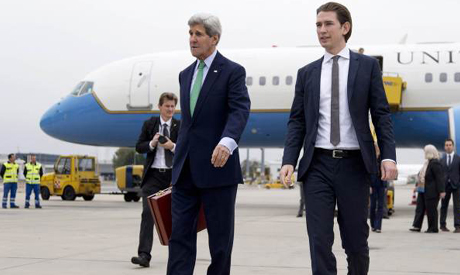
U.S. Secretary of State John Kerry walks to his car with Austria's Foreign Minister Sebastian Kurz (R) as he arrives at Vienna International Airport, in Vienna October 15, 2014 (Photo: Reuters)
A senior U.S. official said on Wednesday a deal on Iran's nuclear programme was still possible by late next month and there were no talks now about extending the deadline, after Tehran and Moscow indicated more time may be needed.
Speaking before a meeting between the U.S., Iranian and European Union foreign ministers, the State Department official said "we're working on creative ways to give us all of the assurances we need" that Iran will not develop nuclear weapons.
"There's a lot of ways to get to 'yes' here," the senior U.S. official said, declining to be named.
However, there were still significant gaps in negotiating positions on Iran's uranium enrichment programme, which is at the heart of a decade-old dispute which over the years has often raised fears of a new Middle East war.
"We don't know if we'll be able to get to an agreement, we very well may not," the official added.
Iran and six world powers - the United States, France, Germany, China, Russia and Britain - aim to end a decade-old nuclear standoff by a self-imposed Nov. 24 deadline.
In a sign of attempts to accelerate their efforts, U.S. Secretary of State John Kerry, Iranian Foreign Minister Mohammad Javad Zarif and European Union foreign policy chief Catherine Ashton were holding talks in Vienna on Wednesday.
The negotiations are centred on curbing Iran's atomic activity, which Tehran says is peaceful but the West fears may be aimed at developing a nuclear weapons capability, in exchange for lifting sanctions.
But with less than six weeks to go before the target date, Western officials say there are still important differences between the sides, especially over the future scope of Iran's production of enriched uranium, which can be used to fuel atomic energy plants but can also provide the fissile core of a bomb if purified to a high degree.
NO "SACRED" DEADLINE DATE
Iran's Parliament Speaker Ali Larijani said in Geneva the United States should stop focusing on the number of Iran's uranium enrichment centrifuges, which he described as a "trivial matter", and concentrate on pushing for a deal.
Western governments want Iran to cut its centrifuge capacity to the low thousands so that it would take Tehran a long time to purify enough uranium for an atomic weapon. Tehran has rejected demands to significantly reduce the number below the 19,000 it has now installed, of which roughly half are operating.
One of Iran's chief negotiators, Deputy Foreign Minister Abbas Araqchi, last week raised the possibility that the talks could be extended, and Russian Foreign Minister Sergei Lavrov on Tuesday said the deadline date was not "sacred".
But the State Department official said: "There is still time to get this done ... In places gaps have narrowed, but the Iranians have some fundamental decisions to make," the official said. "We're not talking about an extension at the moment."
Lavrov, speaking in Paris on Tuesday where he met Kerry, said he was "sure that a compromise is possible" in the negotiations with Iran.
"I can't guarantee you that it would be reached by November 24. This date is not sacred," he told Russian television.
Iran rejects Western allegations that it is seeking nuclear weapons capability, but has refused to halt uranium enrichment, and has been hit with U.S., EU and U.N. Security Council sanctions as a result. Israel has threatened possible military action against Iran if it is not satisfied with any deal.
Iran's Zarif said the sides "might need more time" to discuss the issues and potential solutions, Iran's ISNA news agency reported on Wednesday.
Ashton, Zarif and senior officials from the six powers known as political directors will meet in Vienna on Thursday.
Short link: